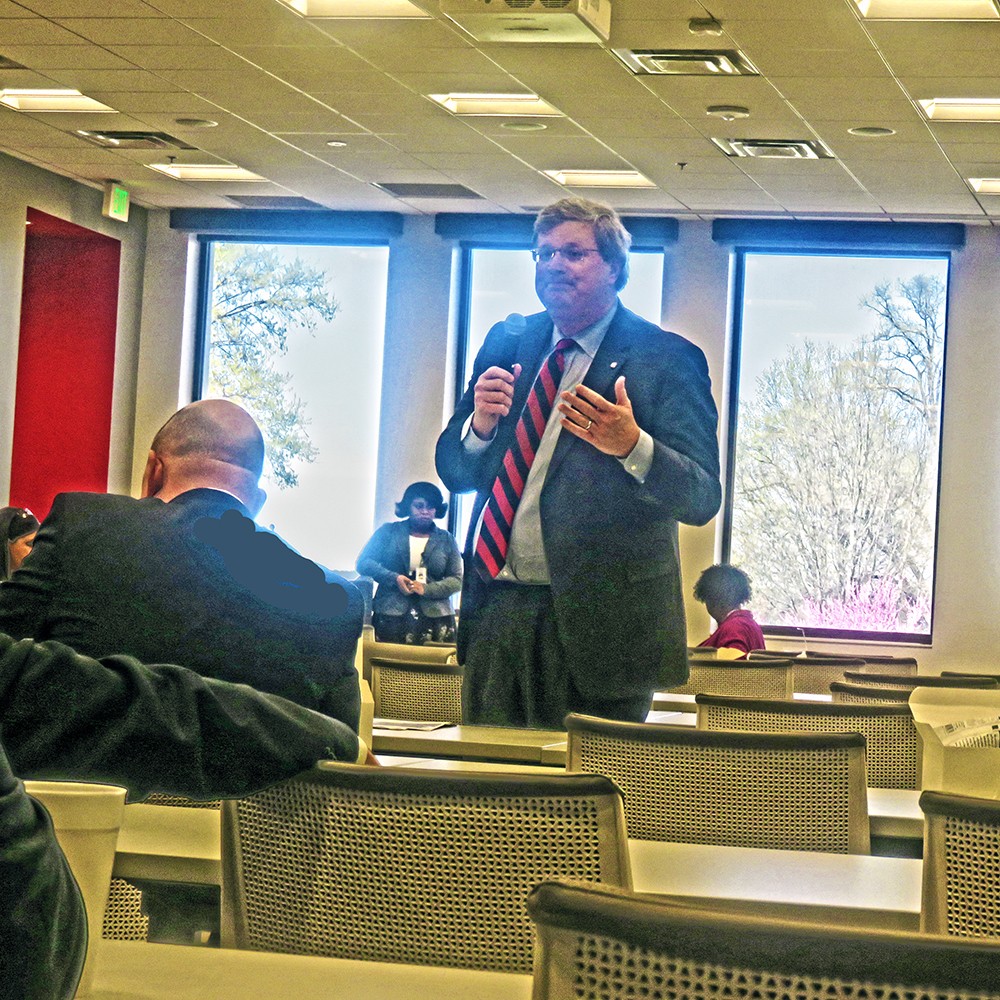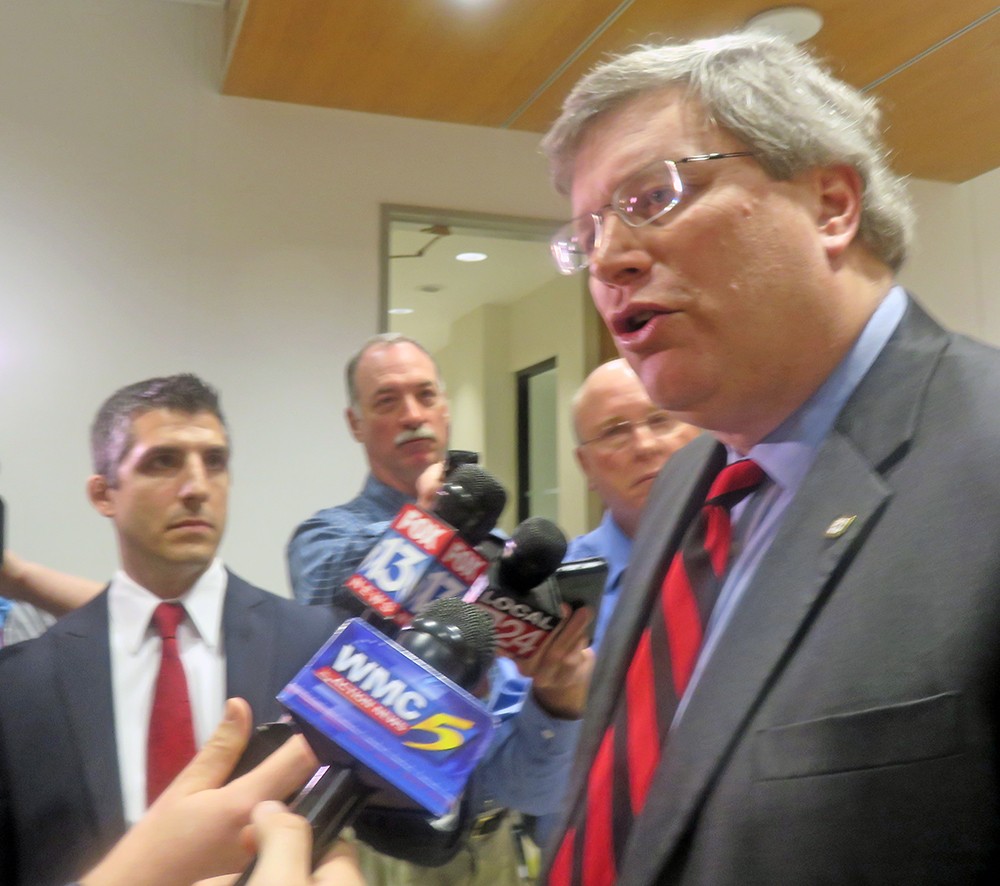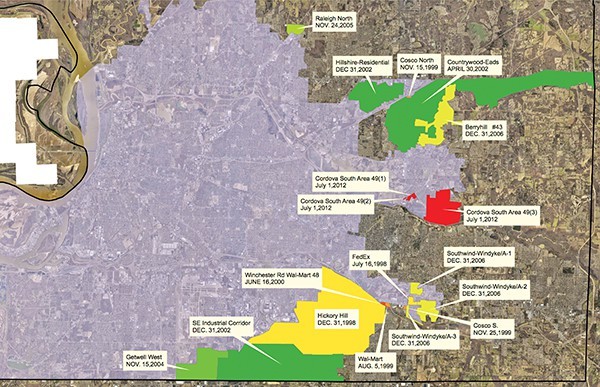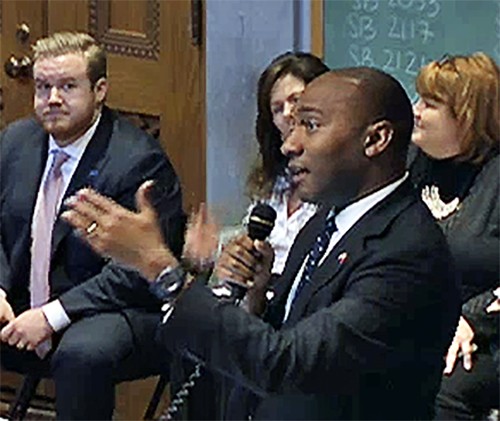NASHVILLE — Maybe it’s because Ron Ramsey, the powerful state Senate Speaker, Lt. Governor, and presumed political careerist, chose Wednesday as his time to announce his decision to exit politics, or maybe it’s just another indication of how Memphis and its perils rate low on the Richter scale of Legislative Plaza these days. Or maybe it’s just a matter of the calendar.  JB
JB
Strickland at Shelby delegation lunch
In any case, outside of those folks who, in one sense or another, represent the sphere of Memphis and Shelby County in Nashville, the Great De-Annexation Crisis has generated very little fuss and bother at the General Assembly in Nashville.
This is despite the fact that Memphis is one of only six municipalities in Tennessee that stand to lose from the de-annexation bill that swept through the House of Representatives on Monday night and has convulsed local government — the Memphis part of it anyhow — with its implications.
It was only on behalf of Memphis that several of the Representatives elected by the city — Joe Towns, G.A. Hardaway, Raumesh Akbari and Larry Miller — and two friendly helpers — House Democratic leaders Mike Stewart of Nashville and Craig Fitzhugh of Ripley — rose on Monday night to protest HB0779/SB0749, the bill brought by two Chattanooga-area Republicans that would allow residents of areas annexed by their municipalities since 1998 to de-annex.
Other cities charged by the bill’s sponsors with “egregious” and arbitrary annexations are Chattanooga, Knoxville, Kingsport and Cornersville. Cornersille? Yes, the tiny Marshall County municipality of 1100 souls was faulted on Monday night by bill sponsor Mike Carter (R-Ooltewah) for grabbing up nine local farms in an arbitrary annexation.
The only one of 16 or so amendments introduced by opponents of the bill that was accepted by Carter was one to delete Johnson City as an offender. What that east Tennessee city had done was to voluntarily consent to the de-annexation of a community called Suncrest and thereby earn a pardon.
It would seem that Memphis Mayor Jim Strickland, for whom this is about the fourth or fifth crisis to hit him unawares during his short term, is agreeable to ceding two of the most recently annexed Memphis neighborhoods — South Cordova and Southwind. He said so to the press after a Wednesday lunch meeting of the Shelby County legislative delegation at Tennessee Tower that he and Shelby County Mayor Mark Luttrell had signed on to long before the current matter broke.
Those two de-annexations would only cost the city $5 million, Strickland said, as against the $27 million or so he estimates that de-annexations of every community absorbed by Memphis since 1998 would cost.
 JB
JB
…and wth the press afterward
The year 1998 is apparently being used as a demarcation point in the de-annexation bill because that is the year of what was supposed to be a settlement of the crisis caused by the fateful Toy Town bill of 1997. That measure, smoothed through the legislature by the late Senate Speaker John Wilder on behalf of a Fayette County client community, would have allowed communities of the most modest size to incorporate and, before it was finally declared unconstitutional by the state Supreme Court (on a caption irregularity, actually), it had already spurred dozens of would-be incorporation efforts on the borders of Memphis.
The resultant 1998 compromise bill assigned municipalities limited areas as expansion reserves and made the process of urban expansion more difficult. But that has clearly failed to appease the adversaries of urbanism, and one wonders if Strickland’s proffered sacrifice will be honored as a stopping point in a revised Senate version or serve merely to whet the appetite of the de-annexationists.
A dialogue Monday between Strickland and Rep. Curry Todd (R-Collierville), one of the more vocal advocates of de-annexation, was not promising in that regard. Todd insisted that the city, in a conference call held at some unidentified earlier point, had agreed to larger concessions, and Strickland (who would later say he had participated in no such conference call) would respond that it wasn’t so.
Beyond the offer to sign off on Southwind and South Cordova, Strickland also floated the idea of somehow offsetting fire and police expenses and of adding utility and OPEB costs to the general obligation bonds that the bill would obligate the residents of any de-annexing area to pay out on a pro-rata basis.
 JB
JB
Germantown Mayor Palazzolo
Granted, the current situation is to the Toy Towns matter as apples are to oranges, but then Mayor Willie Herenton, for better or for worse, was less flexible on concessions by Memphis, and make of that what you will. (One historical analogy that definitely does hold is that County Mayor Luttrell, much in the manner of County Mayor Jim Rout in the Toy Towns era, professes not to be terribly troubled by developments.)
In any case, there may be beaucoup bargaining yet to come before the other legislative foot drops in a Senate vote, probably next week. For what it’s worth, Memphis Democratic Senator Reginald Tate is already showing signs of weakening in his sponsorship of the de-annexation bill under pressure from the media in exposing his legislative history.
Tate, who lost out on a vote to be Senate Democratic leader before the current session by a single vote, has in fact voted so often with Republicans, even on matters arguably counter to Memphis’ interests, that wags in Legislative Plaza refer to his District 33 as “the Ramsey-Tate district.” JB
JB
Curry Todd on the attack
For what it’s worth, spectators for the Monday night vote on de-annexation included a generous supply of mayors of suburban municipalities. Asked about that on Monday, Germantown Mayor Mike Palazzolo said his primary interest in being in town was to resist ongoing efforts to repeal the Hall Income Tax, the proceeds of which are significant add-ons to to the coffers of every municipality in Shelby County, including Memphis.
But Palazzolo acknowledged that his landlocked city would be an interested party if adjacent areas like Windyke became de-annexed in the wake of the current bill.
The question of whether and when such areas, if detached from Memphis, would be eligible for absorption by another municipality, is an intriguing one — and, oddly, several leading proponents of the bill, including Todd and Representative Mark White (R-Germantown) professed not to know what the bill provided in that regard, though House sponsor Carter dismissed the prospect of such re-annexations Monday night on the ground that the bill made them prohibitively difficult.
To say the least, there would seem to be much in the measure requiring a re-examination by all sides.


 JB
JB  JB
JB  JB
JB  JB
JB